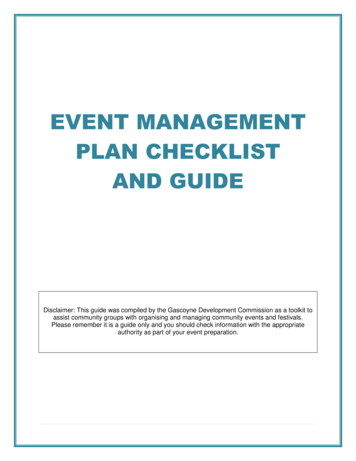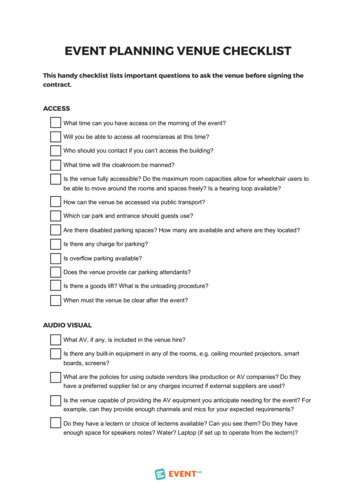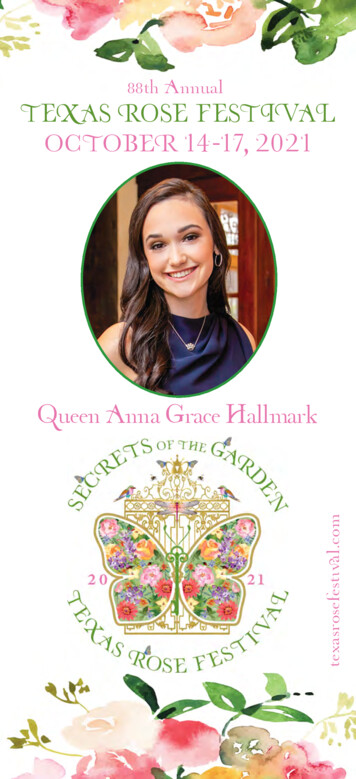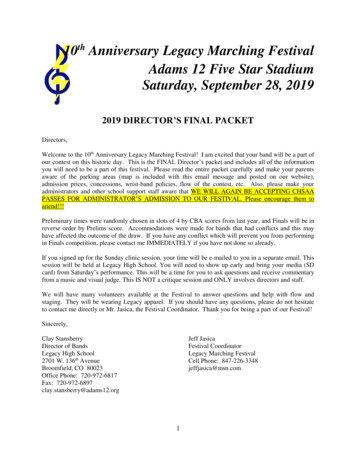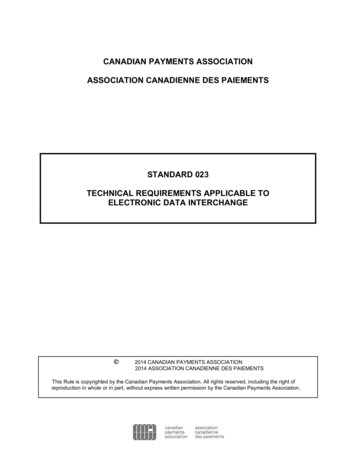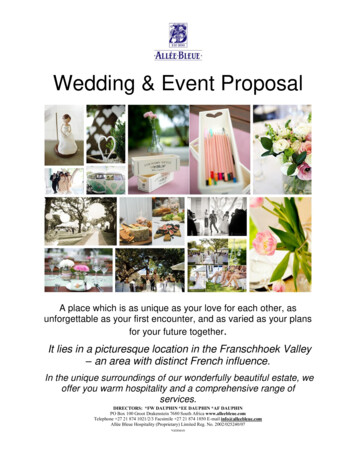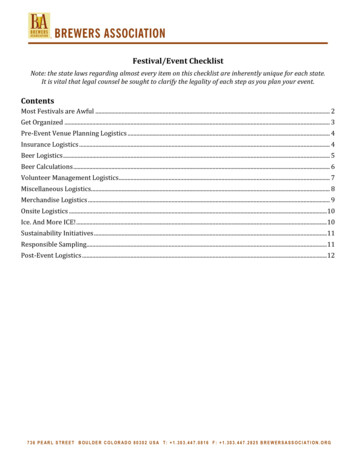
Transcription
Festival/Event ChecklistNote: the state laws regarding almost every item on this checklist are inherently unique for each state.It is vital that legal counsel be sought to clarify the legality of each step as you plan your event.ContentsMost Festivals are Awful . 2Get Organized . 3Pre-Event Venue Planning Logistics . 4Insurance Logistics . 4Beer Logistics . 5Beer Calculations . 6Volunteer Management Logistics . 7Miscellaneous Logistics. 8Merchandise Logistics . 9Onsite Logistics .10Ice. And More ICE! .10Sustainability Initiatives .11Responsible Sampling.11Post-Event Logistics .12736 PEARL STREET BOULDER COLORADO 803 02 USA T: 1.303.44 7.0816 F: 1.303.447.2825 BREWERSASSOCIATION.ORG
Most Festivals are AwfulIn her article, “Why? An Introduction to Festival Planning”, Hope Tschopik Schneider, credited withproducing one of Los Angeles’ most important festivals, The Olympic Arts Festival in 1984, mosteloquently explains the festival experience:“Festivals are not necessarily “good” things nor are they always very good parties or greatcommunal celebrations. Indeed, most festivals are awful. They present local artists under badperformance conditions, on temporary stages, using rented sound systems. This to a bemusedaudience unsure of who is performing, who sit in the sun on rented folding chairs with childrenwho are uncomfortable and restless, surrounded by a sea of people who are milling about, lookingfor food, shopping amidst assembled street fare items, inhaling the delicate smell of fried foodmingled with the even more exotic fragrance of porta-potty chemicals.” I do think it is possible to create a Festival, a festival of value, distinction and purpose. To do sorequires real integrity of purpose (WHY?), real definition and intimate understanding of itsaudience (FOR WHOM?), a real commitment to the uniqueness and quality of the artists to bepresented (WHAT?), and a real sense of the magic of place (WHERE?). It also requires enormoushard work in both planning and implementation. In essence, because a festival is a series of onetime, unique events with new combinations of people, there is no room for error and no time forrefinement. It takes enormous resources to do a festival well, either in the form of a highlymotivated and involved community or in the form of large sponsorship/funding commitments.Festivals, once the definition of who, what and why is set, are exercises in precise technical andproduction planning. There are endless details to run down and nail to the floor. There arefundraising, accounting and cash flow problems to solve. There are production problems to solve.There are audience amenity problems to solve. There are public assemblage and flow problems tosolve. There are political problems to solve. There are huge marketing and public relationsproblems to solve.Festivals, no matter how small or community based, require a staff of vision, expertise andcommitment, an ace technical crew, brilliant marketing and real dollars, up front.”You can read more about festival planning in the excellent free online festival handbook, “AboutFestivals,” produced by Los Angeles Department of Cultural Affairs. It’s not beer festival specific, butthis Adobe pdf document is a compilation of articles from various contributing editors, includingSchneider, with some fantastic insights into the myriad of considerations surrounding successfulfestival execution.Many guilds successfully partner with outside organizations to put on their major fundraising events.This is an outstanding way to minimize upfront costs, liability, and resources. Advanced guildsnationwide have wonderful events that are organized almost entirely by the guild director, butbuilding these events has been a process of years, or in some cases, multiple decades of experience.Those incredible guild sponsored festivals come at the cost of many hard-learned lessons. Indeed,event partners and/or sponsors are key to developing a successful event for guilds both new andveterans to the event planning process. Recruit committee members from groups whose goals arecompatible with those of your festival. Consider promoters already producing your local wellestablished beer festivals, 501(c)3/6 state Not for Profit Corporations, representatives from artscouncils, farm market associations, civic organizations, colleges and universities, and state and localdepartments of tourism or agriculture.736 PEARL STREET BOULDER COLORADO 803 02 USA T: 1.303.44 7.0816 F: 1.303.447.2825 BREWERSASSOCIATION.ORG
Event partners or sponsors add experience and expertise, often assisting with up front funding, andoffer fundamental connections for the venue, food, porta-potties, musicians, and volunteers. They canstrengthen your credibility, generate publicity, and donate goods and services for the event. It’s vitalthe organizing team clearly define the roles and responsibilities, physically and financially, of eachparticipating organization to help the committee work effectively and stay on track throughout theprocess.More resources for special events: levents.htmGuild sponsored events are not a way to raise a lot of money immediately. They can be a part of yourstrategic plan to cultivate future fundraising, and to boost the profile of craft beer in your community.Eventually, after spending a lot of money, learning what works and what doesn’t in the state, and thecareful construction of a strong event program, festivals commonly become guilds' number oneincome source. Unfortunately, one bad event raises all levels of red flags for craft breweries and ourhighly regulated industry. Events involving alcohol of any type MUST be consciously planned andexecuted with the utmost competence, or the results could be detrimental.We've created a basic checklist of best practices through the collaboration of our award winningevents team and leaders from guilds nationwide that put on major fundraising festivals. There arebooks out there on putting on successful festivals and events. This document is not meant to be allencompassing in details, but is intended to be a basic starting point for your consideration in puttingon a brewers guild event that elevates craft beer in your state, shines positive light on your guild'sbrand, and promotes the guild’s craft brewery member businesses.Get OrganizedA good alphabetical list of file folders:AdvertisingGlassesPress ConferenceTaxesBandsHotelsPress eweries & BrandsLayout/Site PlanProduction Co.Vendors (Food & ttersSecurityVolunteersCapacity ll CallDistributorsMedia PlanSocial MediaWrist BandsFact SheetPersonnel (A-Team)Sound & StageFestival OverviewPosterStaffing Co.736 PEARL STREET BOULDER COLORADO 803 02 USA T: 1.303.44 7.0816 F: 1.303.447.2825 BREWERSASSOCIATION.ORG
Pre-Event Venue Planning Logistics Secure venue and dates Public or private property?From Jeff in WI; “We have found that having a municipal partner, in particular onewith funds available for promotion has been a key to our success, and is the firstthing we procure when starting a new festival.I also believe the choice of venue is important. Something with a draw factor on itsown is good.” Avoid other large established events and holidays Permits – special event/celebration/festival, fire permits for cooking demos, catering, etc.Guild nonprofit pulling permits, or brewery, or other?Brian in Texas says “Your state’s Alcoholic Beverage Commission is the first stop inthe planning of a festival. Getting their buy-in is critical. I bring an experiencedalcohol lawyer with me EVERY TIME, just in case.” Capacity of venue Security – Police/Paid Security/Volunteers Catering/Food options – on-site services only? Food trucks? Insurance - see below Bathrooms – are there enough? Porta Potties – multiple day event requires a refresh. Handsanitizers. This portopottie site that helps calculate # of portopotties needed /special-events/planning-toolInsurance Logistics Your guild board members should already be protected with Directors and OfficersInsurance or "D&O". D&O policies vary greatly between companies. From David K in NewYork: “I believe the most comprehensive coverage is offered by Chubb Specialty Insurance(CSI). They offer a 1,000,000 per occurrence and 1,000,000 aggregate policy with a 2,500 per claim deductible. Expect to pay around 2,000 per year for this policy -- it'sworth every cent.” If the space is at/near a brewpub, sometimes the in-effect liability insurance covers thefestival as well as day-to-day operations. General liability and liquor liability (GL & LL) input from David K:o “Event Policies again vary depending on the company. There are a number ofinsurance companies that specialize in Event Policies. You may want to look intoPhiladelphia Insurance Company and K&K Insurance Group for a quote. They bothoffer solid coverage forms.”736 PEARL STREET BOULDER COLORADO 803 02 USA T: 1.303.44 7.0816 F: 1.303.447.2825 BREWERSASSOCIATION.ORG
o “I would recommend an annual policy whereby you can add events if needed. You willneed "General Liability" and "Liquor Liability" coverage. The standard limit is 1,000,000 and the policy allows you to have 3 additional insureds at no additionalcost. There will be additional premium required for additional insured beyond 3.”o “Try to limit the additional insured to property owners and municipalities.”o “Those companies that you hire for services (ie: port-a-potties, etc.) should add yourorganization on their policy as an additional insured.”o “I would also highly recommending obtaining certificates of insurance adding yourorganization as an additional insured from all food and non-beer vendors. Your GL &LL policy will cover the brewery participants so no need for anything from them.”o “Other coverages that are important to festivals include:1. Damage to Rented Premises - standard limit is 300,0002. Medical Expenses - standard limit is 5,000 but you can negotiate a higheramount with some carriers3. Any Auto - this protect you from ANY vehicle involved in your event and4. Excess Liability or an Umbrella - I like to have 5,000,000 in coverage when Ido an event ( 1,000,000 policy 4,000,000 Umbrella). Plan on 1,000 inpremium for every 1,000,000 in coverage.”o “Costs - GL and LL policy depends on the number of attendees and the market(whether soft or hard). Right now the market is still a bit soft but there are rumors ofit hardening soon. Plan on paying roughly 1,500 for a 3,000 to 5,000 person event.” Additional insurance to cover weather?o Paul K in Nebraska: “Even though they are rain-or-shine events, there are things thatdon’t go so well in a torrential downpour / high winds etc. It isn’t very expensiveconsidering it’s only against your base expenses (not any ticket reimbursements etc.)so in the scheme of things, it doesn’t hurt to have it.”o Eric B in Michigan: “We used to consider the use of “Rain Insurance” for our rain,snow, or shine Beer Festivals but once we were fortunate enough to call our events“sell-outs” prior to the day-of, it wasn’t an issue anymore! I will say that bad weatherin one of our first events could have KILLED our finances since we fund all Guildoperations by our Festivals, so I wouldn’t rule out weather insurance as an option.”Beer Logistics To limit number of samples or offer unlimited pours? Some states cannot offer anunlimited number of samples for an entry fee, but can offer additional samples for sale ont
Plan on 1,000 in premium for every 1,000,000 in coverage.” o “Costs - GL and LL policy depends on the number of attendees and the market (whether soft or hard). Right now the market is still a bit soft but there are rumors of it hardening soon. Plan on paying roughly 1,500 for a 3,000 to 5,000 person event.”File Size: 724KBPage Count: 12

